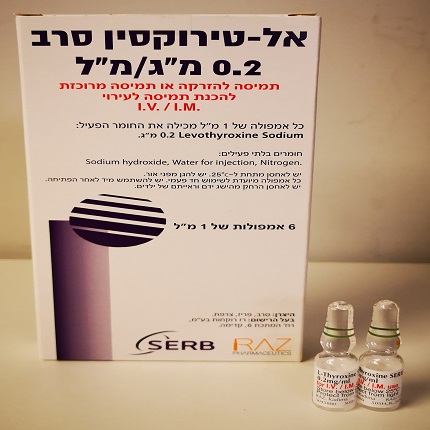Quest for the right Drug

אל-טירוקסין סרב L-THYROXINE SERB (LEVOTHYROXINE SODIUM)
תרופה במרשם
תרופה בסל
נרקוטיקה
ציטוטוקסיקה
צורת מתן:
תוך-שרירי, תוך-ורידי : I.M, I.V
צורת מינון:
אין פרטים : SOLUTION FOR INJECTION/ CONCENTRATE FOR SOLUTION FOR INFUSION
עלון לרופא
מינוניםPosology התוויות
Indications תופעות לוואי
Adverse reactions התוויות נגד
Contraindications אינטראקציות
Interactions מינון יתר
Overdose הריון/הנקה
Pregnancy & Lactation אוכלוסיות מיוחדות
Special populations תכונות פרמקולוגיות
Pharmacological properties מידע רוקחי
Pharmaceutical particulars אזהרת שימוש
Special Warning עלון לרופא
Physicians Leaflet
Interactions : אינטראקציות
4.5. Interaction with other medicinal products and other forms of interaction Combinations not recommended St. John’s Wort (Hypericum perforatum L.) Risk of increased hepatic clearance of levothyroxine resulting in reduced serum concentrations of thyroid hormone and risk of decreased clinical effects. Therefore, patients on thyroid replacement therapy may require an increase in their dose of thyroid hormone if these products are given concurrently. Combinations requiring precautions for use Anti-diabetic agents Levothyroxine can reduce the blood sugar-lowering effect of antidiabetics (e.g. metformin, glimepiride, glibenclamide and insulin). Therefore, blood sugar levels in diabetic patients must be regularly checked, particularly at the start and at the end of thyroid hormone treatment. The dose of the blood sugar-lowering drug should also be adapted. Coumarin derivatives Levothyroxine can intensify the effect of coumarin-derivatives through plasma protein binding displacement. Therefore, regular blood coagulation checks are necessary in the case of simultaneous treatment; the dose of the anticoagulant must be adapted, if necessary (dose reduction). Propylthiouracil, glucocorticoids and beta-receptor blockers (especially propranolol) These substances inhibit the conversion of T4 into T3 and can result in a lowered T3 serum concentration. Amiodarone and contrast media containing iodine Due to their iodine content, these agents can trigger hyperthyroidism as well as hypothyroidism. Special care should be taken in the case of nodular goiter with possibly undetected functioning autonomies. Amiodarone inhibits the conversion of T4 into T3, resulting in a lowered T3 serum concentration and an increased TSH serum level. Salicylate, dicumarol, furosemide, clofibrate Levothyroxine can be displaced from the plasma protein binding through salicylate (particularly in doses greater than 2.0 grams per day), dicumarol, high doses (250 milligrams) of furosemide, clofibrate and other substances. This can lead to an initial, temporary increase of free thyroid hormones, jointly followed by a decrease of the total thyroid hormone level. Contraceptives containing oestrogen, drugs for post-menopausal hormone substitution The levothyroxine demand can increase during the intake of contraceptives containing oestrogen or during post-menopausal hormone replacement treatment. There may be increased binding of levothyroxine, which may lead to diagnostic and therapeutic errors. Sertraline, chloroquine/proguanil These substances reduce the efficacy of levothyroxine and increase the TSH serum level. Enzyme inducing drugs Barbiturates, rifampicin, carbamazepine, phenytoin and other drugs with liver enzyme-inducing characteristics can increase the hepatic clearance of levothyroxine and result in a decreased plasma level. Protease inhibitors There are reports stating that protease inhibitors can result in a loss of the therapeutic effect of levothyroxine if simultaneously administered with lopinavir/ritonavir. Therefore, careful monitoring of clinical symptoms and thyroid function should be carried out in patients who use levothyroxine and protease inhibitors simultaneously. Tyrosine kinase inhibitors (e.g. Imatinib, sunitinib, sorafenib, motesanib) These agents can reduce the efficacy of levothyroxine. Therefore, careful monitoring of clinical symptoms and thyroid function should be carried out in patients who use levothyroxine and tyrosine kinase inhibitors simultaneously. Interferences with laboratory test: Biotin may interfere with thyroid immunoassays that are based on a biotin/streptavidin interaction, leading to either falsely decreased or falsely increased test results (see section 4.4).

שימוש לפי פנקס קופ''ח כללית 1994
Thyroid deficiency states
תאריך הכללה מקורי בסל
01/01/1995
הגבלות
תרופה שאושרה לשימוש כללי בקופ'ח
מידע נוסף
